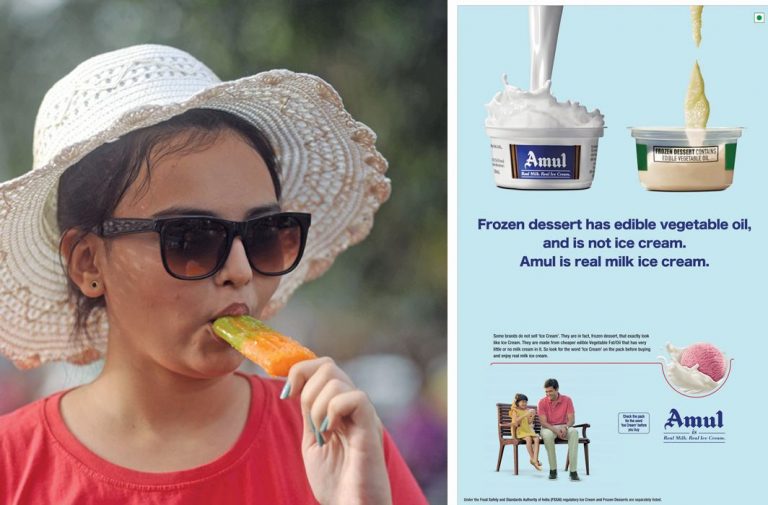
Above: The Amul brand enjoys tremendous goodwill. It can therefore take on the competition through provocative advertising. Photo: UNI
The case between Amul and Kwality Wall’s shows that winning in court is no substitute for winning hearts and Dr Verghese Kurien’s brand will win hands down
~By Gopinath Menon
In a competitive world, it is not uncommon for players to engage in battles in a playing field, other than marketing. Nine out of ten times, it is the result of a trait called ego. The plaintiff will always be the one who has been a bad loser and will resort to innovative means to curb competing brands from growing their market share. This is not new at all. Companies have been battling competitors for ages for logical or trivial reasons.
I remember in the late nineties, when I used to work on a world famous soft drink brand, how secretive the company used to be about each executive on the business and how many non-disclosure papers they had to sign before they started working. Although after working for some months when you take a deep breath and let the hysteria die down and think logically, you figure out that both brands are nothing but sugared water with different doses of fizz content. But it was almost like a war, and the passion kept on egging people to get innovative ideas before the competitor could get them. So it was common for gadgets, health drinks, consumer electronics, tyres, etc, to battle it out, sometimes for fame, name and for out-of-court settlements.
To my mind, the case of Amul vs Kwality Wall’s is unnecessary. It seems like a case of bruised ego in the boardroom. The judgment, announced by Bombay High Court may make Kwality Wall’s rejoice, but it would be living in a fool’s paradise if it thinks it can win in the market place. The case is just a battle between vegetable oils and milk fat— two ingredients that classify frozen desserts and ice cream as per Indian laws defined many moons ago. If vegetable oils are used, then it is frozen desserts and if milk fat is used, it is ice cream.
These facts are clearly mentioned on the pack and hence, I do not see anyone misleading the consumers. The fact is that vegetable oil has no cholesterol, whereas milk fat does. Hence, the surprise lies in Kwality Wall’s taking the issue to the courts rather than highlighting the “No Cholesterol” fact in their advertising. This would have cut more ice with the public, which is trying hard to be a more fit nation.
The surprise lies in Kwality Wall’s taking the issue to the courts rather than highlighting the “No Cholesterol” fact in their advertising.
Initially, the Advertising Standard Council of India was approached and it is believed it saw nothing wrong in what Amul was doing and told both parties so. This prompted Unilever to go to Bombay High Court for justice and it did so with all its might. Maybe it was the lineage of Unilever that was hurting them—the lineage of its brand Dalda becoming synonymous with Vanaspati (hydrogenated vegetable oil) which was seen as an alternative to pure ghee. It never quite achieved that status as it was perceived only as a poor man’s ghee.
The Bombay High Court has pronounced its verdict, but by then, Amul had made its point loud and clear. My experience says that the consumer psyche will help Amul even more now. The logic is simple. The summer heat is at its peak in the country which will ensure that the craving for ice cream will be on an upward swing. One seldom scans the pack for the ingredients used before buying as the brand choice is made with the heart and not with the head. It is here that Amul will win hands down.
Unilever is a great company with many fascinating brands which are household names, but it is still seen as a foreign company making money in India. One can seldom think of a foreign multinational involved in helping society or the deprived to build social capital.

Amul, on the other hand, has a lineage of touching millions of lives in a positive, healthy and progressive way. It was a milk revolution started by the legendary Dr Verghese Kurien five decades ago which helped thousands of dairy farmers and millions of households prosper with pride. This is the big difference that Kurien inculcated in the Gujarat Cooperative Milk Manufacturing Federation—community development, interactivity and participation in progress. This is rare in the corporate world even today.
Post the success of Amul in the seventies, many states set up similar federations but few saw success as the integrity and purpose was missing. Kurien, who had a successful career abroad, had given up everything to come and live in the then dusty town of Anand, and to change the lives of millions of farmers in times to come. It was a small movement with select dairy farmers that became a revolution and is now part of folklore.
The advertising that was done via the Amul topical cartoons have contributed significantly. Finally the brand stance as Amul: The Taste of India. These are challenges that Unilever will seldom be able to stand up against and that’s the market reality.
Amul is a case study that is now taught in business schools. These are nuggets that iconic brands are made of and no multinational with all its muscle can erase this from the hearts and minds of people. But yes, lawyers on both sides will laugh all the way to the bank.
—The writer is a business strategist and content writer


